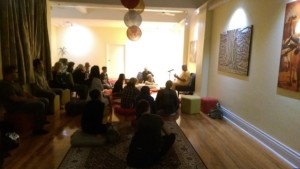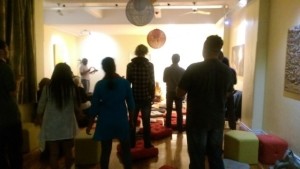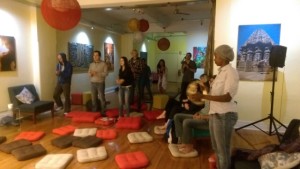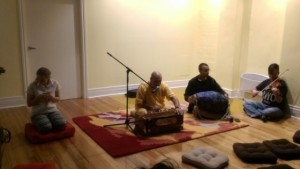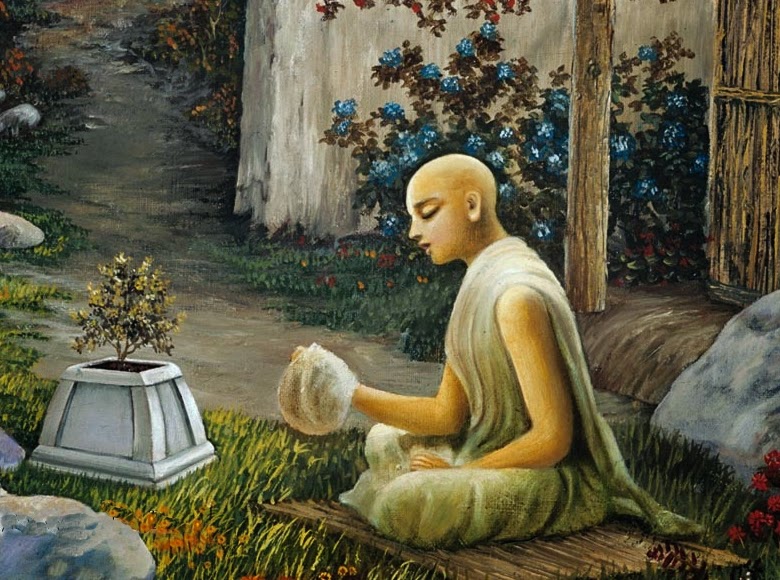
Srila Prabhupada sitting on the front lawn of the “grey house.” 1974
Strengthening The Vision: Prabhupada’s Third Visit to New Vrindaban
Written by Madhava Smullen. Archival Research by Chaitanya Mangala.
From July 18th to 23rd 1974, Srila Prabhupada visited New Vrindaban for the third time, to further establish his vision for it as a sacred place known worldwide for five primary things: cow protection, simple-living, holy pilgrimage, spiritual education, and above all, loving Krishna.
In a letter one year earlier, the ISKCON Founder-Acharya had written to encourage the expanding farm community: “Yes! Go on acquiring the surrounding lands, and in this way we will establish a local self-governing village and show all the world a practical example of spiritual life as Krishna Himself exhibited in Vrindaban.”
As his arrival date fast approached, New Vrindaban residents were whipped up in a flurry of activity. Meanwhile a letter from the editors of Brijabasi Spirit magazine reminded them, “Although we are all engaged in preparing the outward appearance of the community for Srila Prabhupada’s arrival, we must even more so develop the proper consciousness to receive such a great personality.”
And so it was that all the New Vrindaban devotees absorbed themselves in a rip-roaring kirtan as they waited outside their Bahulaban farmhouse temple on Thursday July 18th, every passing car eliciting from them a sharp intake of breath. When Prabhupada finally arrived, he was followed by a river of devotees, calling “Jaya Srila Prabhupada!” as he walked regally into the temple, offered his respects to Sri Sri Radha-Vrindabanchandra, and took his seat on his vyasasana.
In the Brijabasi Spirit, devotees describe “sheer spiritual force” permeating the temple room when Prabhupada began leading “Jaya Radha Madhava.” As Lord Krishna Himself states in Srila Prabhupada’s book Krsna: The Supreme Personality of Godhead, “A pilgrimage site becomes a holy place because of the presence of the saintly persons there.”
After his short but blissful kirtan, Prabhupada then delivered his arrival address, giving devotees an example of the kind of spiritual education he wanted New Vrindaban to be known for.
“So you are all very lucky in this far remote place, that is New Vrindaban,” he began. He talked about how Bhaktivinode Thakur, who had the idea to spread Krishna consciousness all over the world, had been a householder just like the residents of New Vrindaban; and about how they had the chance to provide the essential spiritual education that none of the country’s universities, colleges and schools did.
“I am very happy in this remote village,” he concluded. “You have got… Vrindaban Chandra. Vrindaban Chandra means the full moon light of Vrindavana… So worship the Deity and send missionary men from village to village and preach then gradually this center will be developed… So I thank you very much for your activities here. Hare Krishna.”
With another ecstatic kirtan following him, Prabhupada was then chauffeured to his residential quarters at the “Grey House” in Guruban, which had been renovated from top to bottom by an enthusiastic crew of devotees.
The next day, he toured the Bahulaban barn, to see how his cow protection vision was practically manifesting. He expressed his approval as devotees showed him their Harvestore silo, demonstrated its feeding system, and pointed out the lettering at the top that read “New Vrindaban — Founder and Acharya A.C. Bhaktivedanta Swami Prabhupada.”
Later the same day, Srila Prabhupada visited his under-construction Palace, which was being built for him to reside and translate his books in. He beamed as Kirtanananda showed him where his bedroom, bathroom, Deity room and study would be, tapping the walls with his cane to make sure they were solid.
As Prabhupada inspected the Palace – nothing more than a construction site at the time — Bali Mardan asked if it would be illuminated with jewels on the wall, like Lord Krishna’s Palace in the Krsna book.
Srila Prabhupada looked over at Soma and Gostabihari, two construction workers on the job at the time. They had been toiling hard on a building site that had neither electricity nor running water. “These devotees,” he said, “Are my jewels.”
When Kirtanananda told Prabhupada the Palace would be ready soon and asked him to be patient with them, Prabhupada said, “I already am,” and added, “If you want, I am already living here.”
As he got into his car to leave, he looked up at Soma and Gostabihari through the open window. “So, you are working here?”
“Ghostabihari answered, ‘Yes Srila Prabhupada,” Soma recalls. “And then Prabhupada looked straight at us and said, ‘Thank you very much.’ It made me feel so good that he personally thanked me for working there.”
The next day, Saturday July 20th, about 400 devotees from all over North America including GBCs, sannyasis, travelling book distributors, and ISKCON Press staff gathered for a huge festival. Prabhupada attended guru-puja and gave Bhagavatam class in the morning. During the day there were ecstatic kirtans led by visiting devotees, and a delicious feast “with more preparations than anyone could eat,” according to Brijabasi Spirit.
In the evening, Srila Prabhupada spoke to a rapt audience, concluding his lecture by asking the devotees to all cooperate together “and then everything will go nicely.”
The next day, he initiated thirteen devotees, including Madhava Gosh, Tapanacarya, Advaitacarya, Rasalila, Nirmala, and Meghamala. He also awarded brahmana initiation to six candidates, including Parasara and Kashyapa (who would later become Varshana Swami).

Prabhupada presides over an initiation ceremony at Bahulaban.
In his talk, Prabhupada spoke about the simple-living aspect of his vision for New Vrindaban. He called the race for sense gratification unnecessary and praised living peacefully in a little cottage, growing vegetables and food grains, and getting milk from the cows. “We are trying to introduce in this New Vrindaban colony this simple life,” he said.
Later during his stay Prabhupada personally saw the Brijabasis’ efforts at this simple life. In 1973, he had written a letter instructing them how to build small cottages with wooden beams and tile roofs. “This design is especially suitable for grhasthas, who can feel very comfortable there,” he wrote.
Now he visited one of these cottages, dubbed “Prabhupada houses,” that had been built at New Vrindaban. Set in the Madhuban section of the community, it was home to Daivata Das and his wife Parayana Dasi.

Prabhupada visits a “Prabhupada House” at Madhuban.
When Prabhupada arrived, he appreciated the gardens where many householders were cultivating vegetables together, as well as the just-harvested vegetables on Daivata’s porch. “I do not want to eat anything unless it is grown here,” he said. “You should not buy, you should grow vegetables.”
He thoroughly inspected the cottage he himself had provided the design for with some interest, tapping the walls with his cane in his endearing way. Inside, he sat on a rocking chair, looking at everything and saying, “You should make thousands of these nice houses.” He then asked Daivata, “You are happy here?”
“Oh yes Srila Prabhupada, very happy. Thank you very much,” Daivata said.
Prabhupada continued chatting and laughing with Daivata for some time, asking about his four-month-old daughter Devahuti and commenting on how active she was. “I am very pleased to see this place,” he said before he left.
Prabhupada’s warm, personal interaction with Daivata was exemplary of all the interactions he had during his visit, with many devotees remembering his care and love in different ways.
Varshana Swami was impressed at how concerned Prabhupada was about making sure there were oxen and men working in the fields. “It really touched me that Prabhupada was attentive to what was being done in the agricultural realm,” he says.
Mahadevi Dasi will never forget the time that Prabhupada was giving out milk sweets to a huge crowd of devotees, and she worried that she wouldn’t get one. “As if he just read my heart, he looked directly at me, pointed his finger and held up the milk sweet that he had just bitten,” she recalls. “And it was passed through the devotees, right to me.”
And Gopalasapriya Dasi recalls how when Srila Prabhupada was talking to a group of devotees outside on a chilly evening, he stopped, looked at her and asked, “Are you alright? Such a thin cloth. Haven’t you got a cloth?” He then told one of the leaders, “You must find out if they have everything they need… the women need to be protected. They will not ask. You must ask them once a month and make sure that they are having everything they need.”
“I remember afterwards a few of the devotees were crying and feeling like he was so observant and concerned and he really does care about all of us,” she says.
For his part, Srila Prabhupada, like a proud parent, was very glad to see his first farm community growing into a wonderful realization of his vision.
“Regarding New Vrindaban I was very happy when I was there,” he wrote a few months after his visit. “Not only myself but all devotees and GBC members all enjoyed the atmosphere of New Vrindaban, especially the cow protection scheme. May Krishna give more facilities to advance the cause of New Vrindaban, and I am expecting very soon to go there and live in my proposed palace at least for some time.”

Prabhupada and devotees on an early morning walk along the Talaban lane.




























